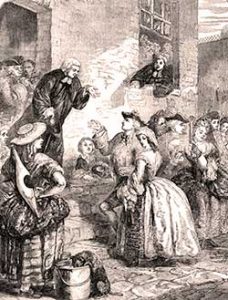
A Fleet Prison marriage. Wikimedia.
Chamber’s Book of Days (1881) is full of fascinating tidbits, some of which concern imprisonment. One is an account of shady marriages conducted by incarcerated clergymen of the Fleet Prison, London.
“The trade was taken up by clerical prisoners living within the Rules of the Fleet, who, having neither cash, character, nor liberty to lose, became the ready instruments of vice, greed, extravagance, and libertinism.”
The Book of Days gives several examples of propertied women seized in unguarded moments and forced into marriage at these places. However, most of the marriages seem to have been entered into for convenience sake or to cut costs. Chambers quotes the Weekly Journal of June 29, 1723: “From an inspection into the several registers for marriages kept at the several alehouses, brandyshops etc. within the Rules of the Fleet Prison, we find no less than thirty-two couples joined together from Monday to Thursday last without licenses, contrary to an express act of parliament against clandestine marriages, that lays a severe fine of £200 on the minister so offending, and £100 each on the persons so married in contradiction to the said statute. Several of the above-named brandymen and victuallers keep clergymen in their houses at 20s per week, hit or miss; but it is reported that one there will stoop to no such low conditions, but makes, at least, £500 per annum, of divinity jobs after that manner.”
In spite of the law, the trade was openly advertised. One of the ads quoted by Chambers read, “J. Lilley, at ye Hand and Pen, next door to the China-shop, Fleet Bridge, London, will be performed the solemnisation of marriages by a gentleman regularly bred at one of our universities, and lawfully ordained according to the institutions of the Church of England, and is ready to wait on any person in town or country.”
According to Chambers, “The parson and landlord (who usually acted as clerk) divided the fee between them—unless the former received a weekly wage—after paying a shilling to the plyer or tout who brought in the customers. The marriages were entered in a pocket-book by the parson, and afterwards, on payment of a small fee, copied into the regular register of the house, unless the interested parties desired the affair to be kept secret.”
One of Chambers’ sources reported being accosted when he passed the area with the question, “Sir, will you be pleased to walk in and be married?” and added, “The parson was seen walking before his shop; a squalid profligate figure, clad in a tattered plaid night gown, with a fiery face, and ready to couple you for a dram of gin or a roll of tobacco.”
